Linda Ronstadt: Why Is She The Queen Of Lonely?
Interview by Elizabeth Kaye - Redbook Magazine
February, 1979
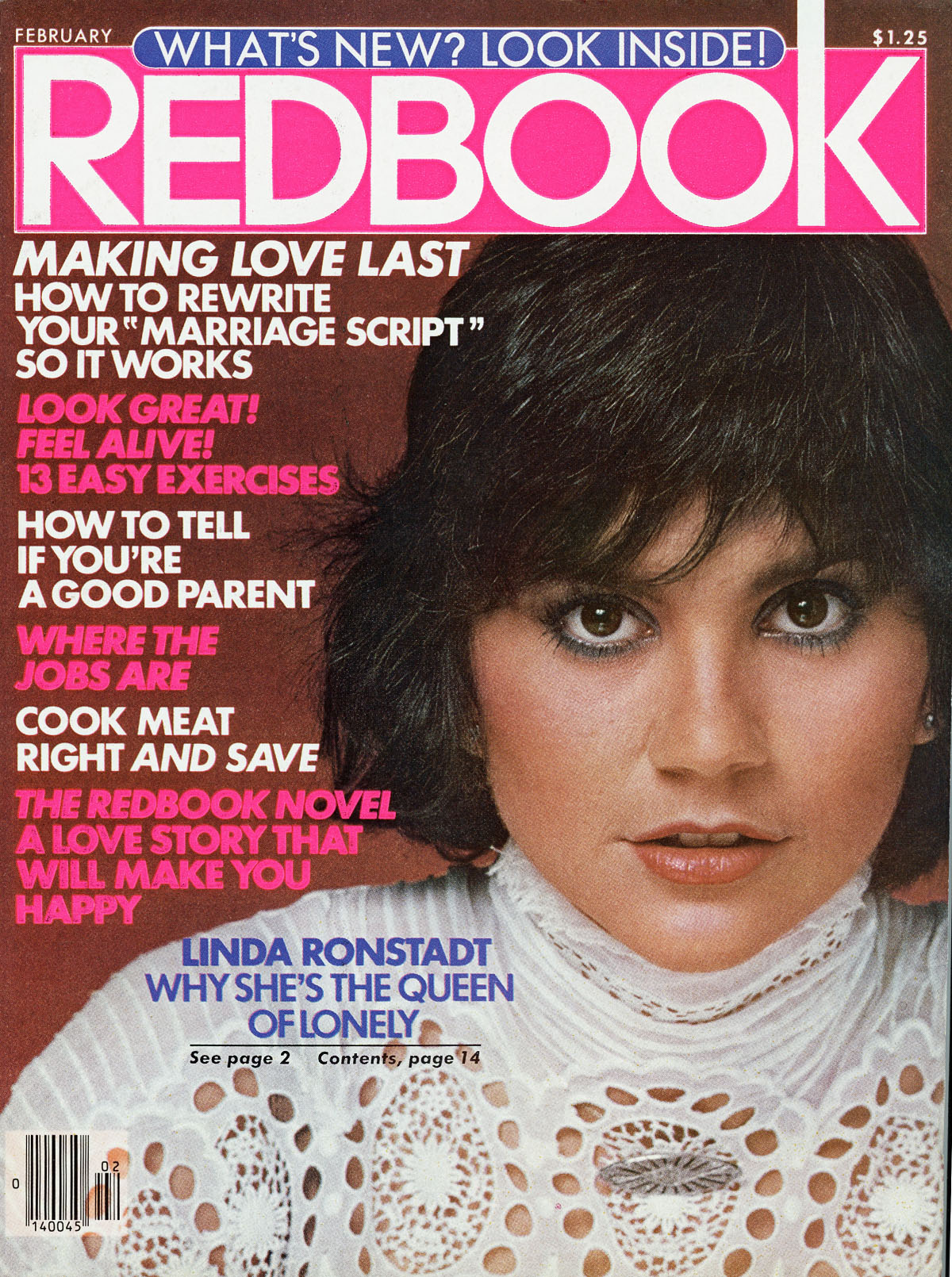
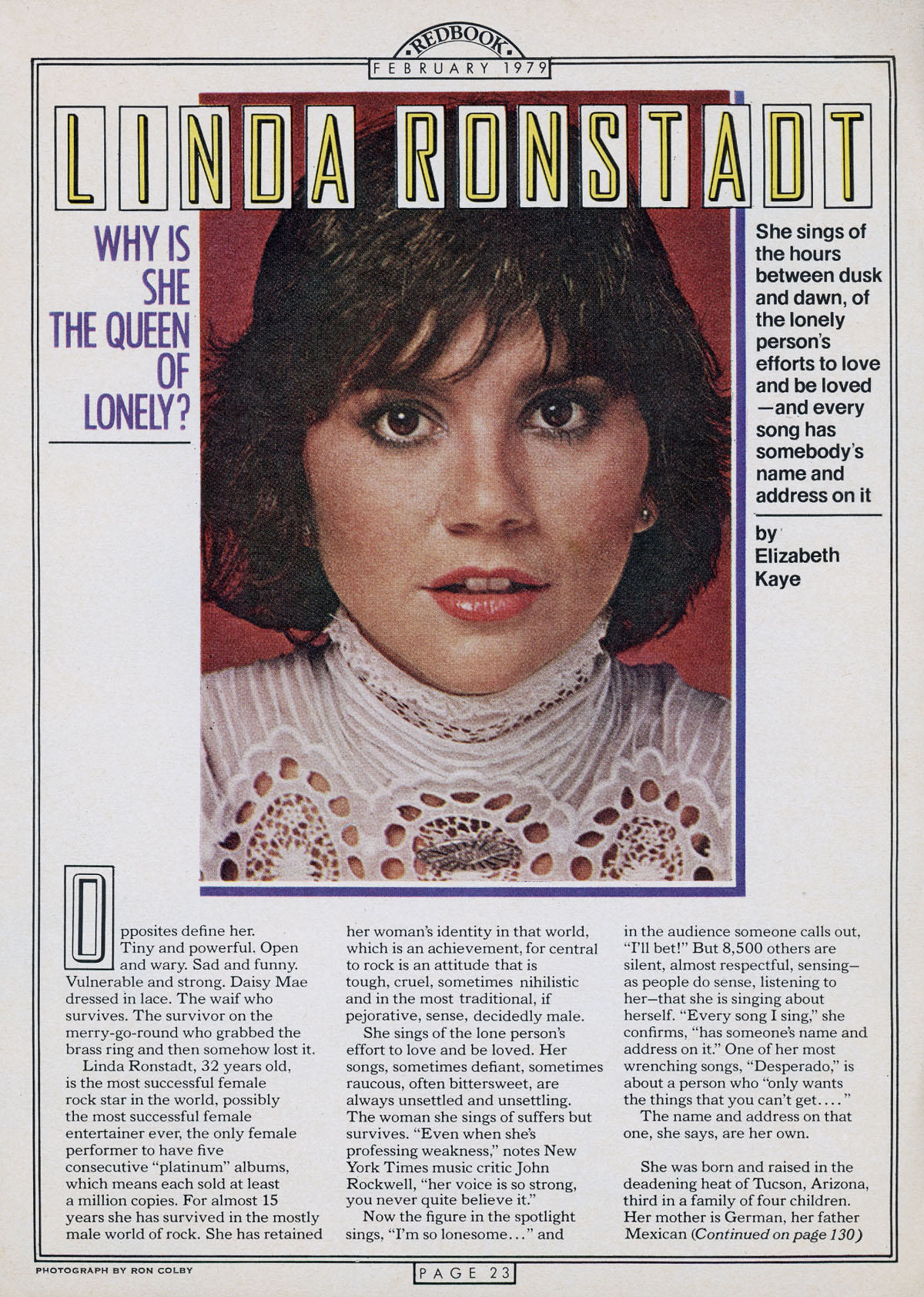
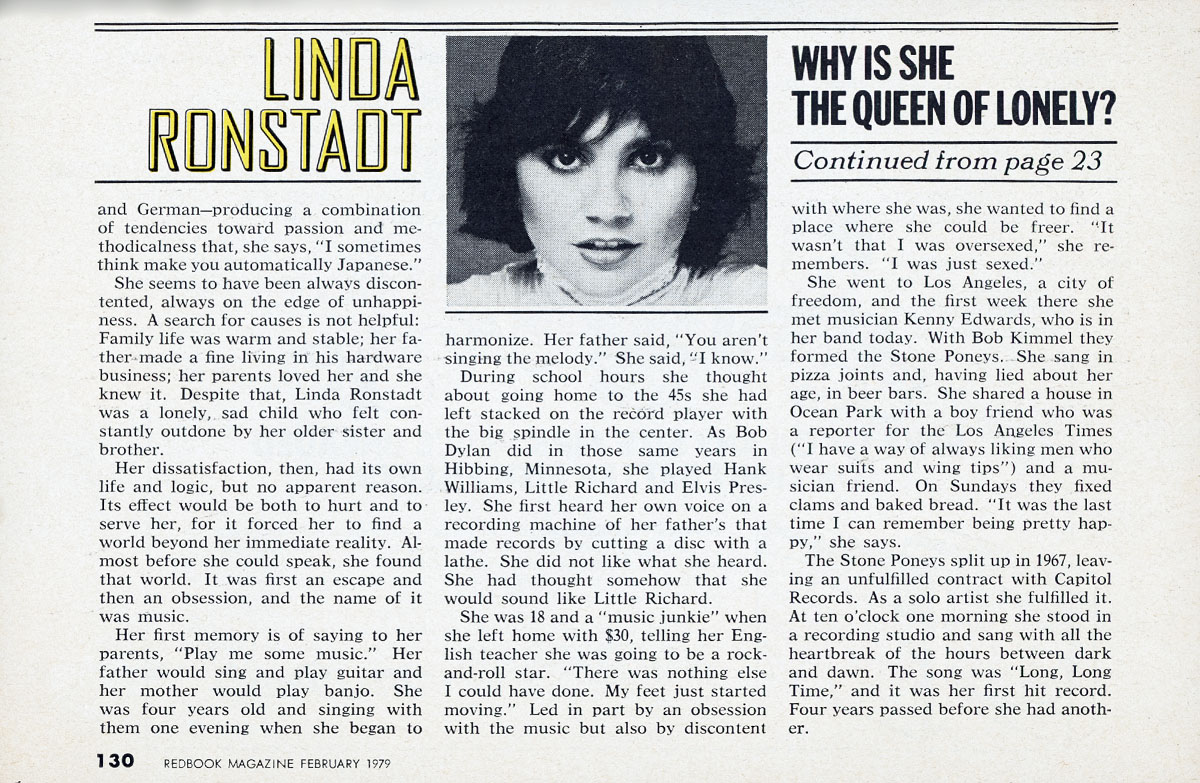
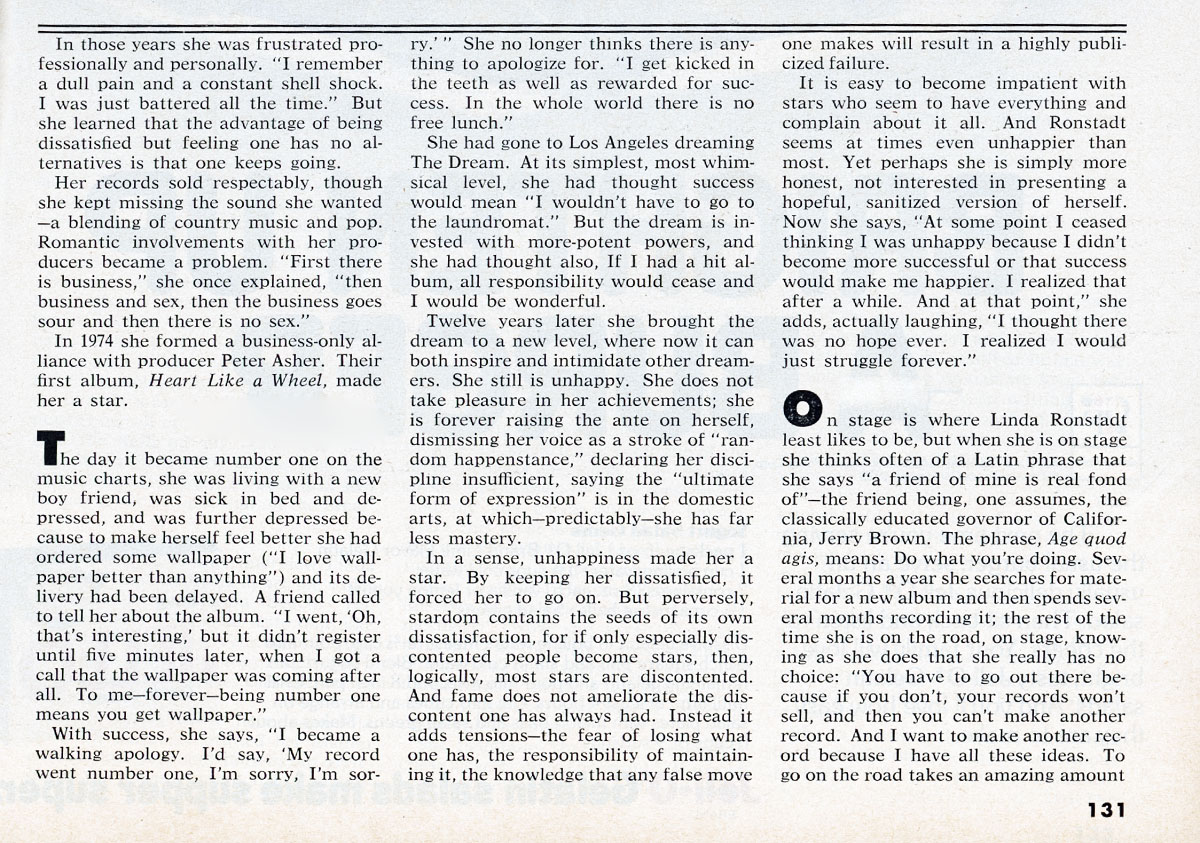
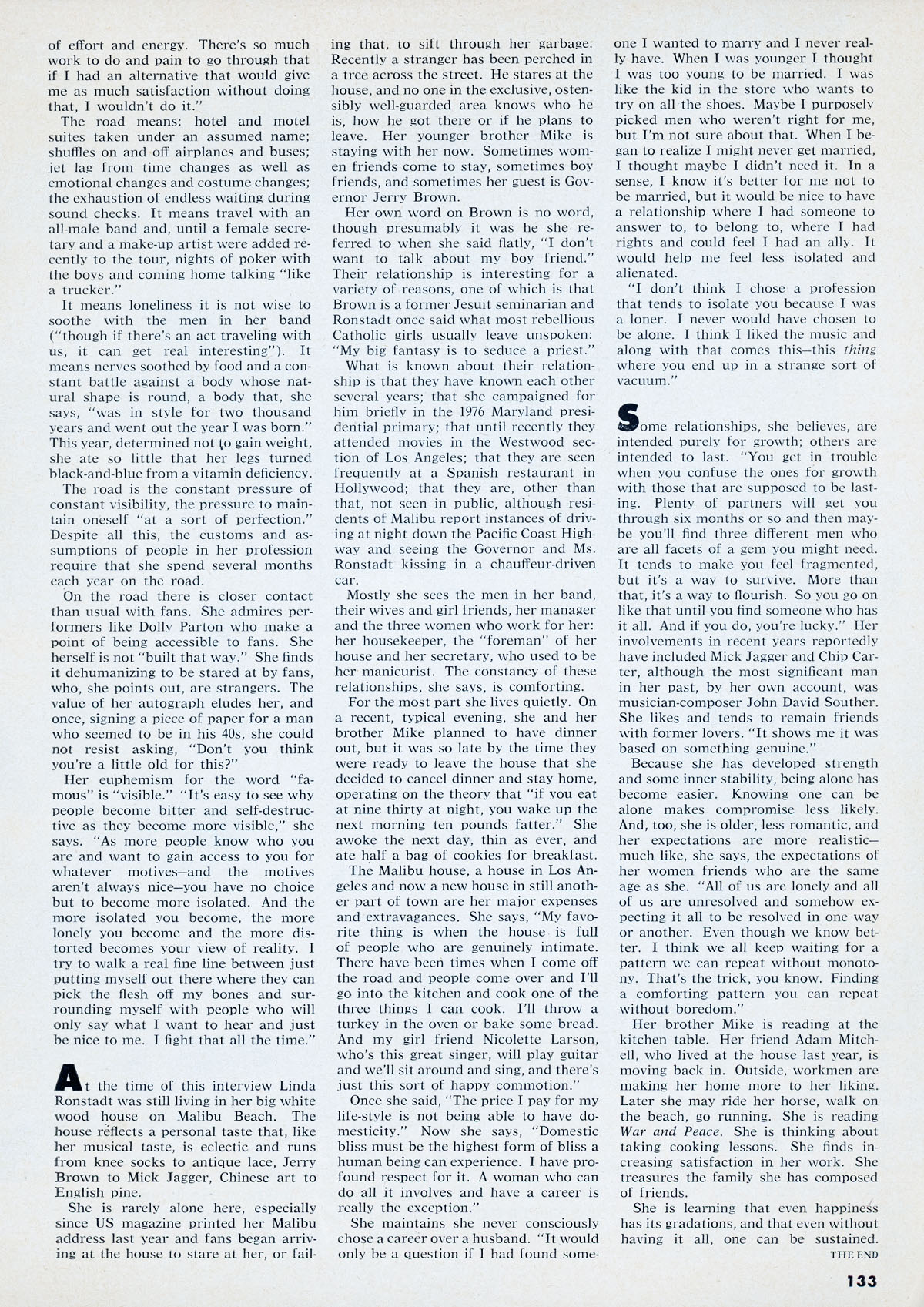
Linda Ronstadt had the flu. She had just struggled valiantly out of bed to face our cameras, and she was
waiting, wrapped in a terry-cloth bathrobe and eating a banana, for her hair to dry. A bouquet of
long-stemmed American Beauty roses - a gift from an admiring friend - lay wilting on the coffee table of her
hotel suite, still wrapped in the paper they had come in. Linda regarded them sorrowfully. "I didn't have a
vase for them when I came in last night," she said. "I could have put them in the bathtub, but it was either
them or me, and I won."
The picture you see on our cover is a triumph of grit over flu. But photographs of Linda are slightly
deceptive. For one thing, she has glints of gray in her glossy brown hair, and tiny frown lines between her
big brown eyes, and an imperfect nose - all of which make her face more interesting and extraordinary than
most faces you could name. And, the in-person Linda laughs and smiles a lot but the on camera Linda
has a pouty, smoldering sexuality and a congenital fear of smiling. Of course, with the flu, who feels like
smiling? But I did once say to her, "You do pouting very well," and she said, "I practice."
Let me tell you something about what it takes to make a Redbook cover portrait of Linda Ronstadt.
There is a fashion editor and her assistant. There is a photographer and his assistant and the man who runs
his studio. There is a hair stylist and a make-up artist and an art director. And there are a couple of cats.
And poor Linda Ronstadt had to walk into this room full of strangers and be both beautiful and cheerful.
At one point we decided to give her a break, and we cleared the studio of everyone except Linda and the
photographer, Ron Colby. But we kept peeking through the keyhole, and the art director,
Maxine Davidowitz, kept shouting, "Isn't there a law about the two of you being alone together, like in a
gynecologist's office? Don't you have to have a nurse present?"
Before the shooting I had gone into
Max's office and extracted a promise. "Swear to me," I begged, "that there will not be any Linda Ronstadt
records playing on the stereo when we walk in." She agreed that would be tacky, and promised. Now,
usually at a cover shooting we sort of prance around a lot and clown and sing old camp songs and do
impressions of Barbra Streisand - just to loosen everybody up. But it's a little intimidating to do that in front
of one of the most successful entertainers in the world. So we put some music on the stereo in the
background and pretty much ignored it until we realized it was a funereal dirge that was making everyone
singularly depressed. And then, much to our embarrassment, we realized that we didn't have any other
music. (It's something like inviting Julia Child to dinner and discovering that all you have in the pantry is
canned pork and beans.)
We finally resorted to the radio. We spent a lot of time rummaging
through Linda's closet, deciding on costumes. ("You bring what you have," she'd told us, "and I'll bring
what I have, and we'll play.") Up until a year ago, all she owned was jeans and two dresses to take on the
road for concerts. Then she discovered clothes - and a sense of fashion that ranges from cowboy boots to
funky furs. (Once the Los Angeles Dodgers gave her a baseball jacket, which she took to a furrier and
had copied, so now she has a little beaver baseball jacket.) She was also wearing an extremely beautiful
simple diamond bracelet - just like a strand of pearls, only they were diamonds - and we casually
remarked, "That must have been a loving gift from a generous friend." "Are you kidding?" she said. "I
should only find somebody who would buy me things like this."
Right after our cover shouting, Linda sailed for Europe for a much-needed vacation, taking her mother
along, she said, "just to be sure I'd go." Last year, instead of a vacation, she went to Nashville and spent
ten days recording a not-yet-completed album with Dolly Parton and Emmy Lou Harris, harmonizing happily
with their two voices and feeling "like lecithin in a candy bar."
The cover is an interesting portrait, and the article on page 23 is an interesting portrait too. Do read it and
find out why she sings all those sad songs.
Opposites define her. Tiny and powerful. Open and wary. Sad and funny.
Vulnerable and strong. Daisy Mae dressed in lace The waif who survives. The survivor on the
merry-go-round who grabbed the brass ring and then somehow lost it.
Linda Ronstadt, 32 years old, is the most successful female rock star in the world, possibly the most successful
female entertainer ever; the only female performer to have five consecutive "platinum" albums, which means
each sold at least a million copies. For almost 15 years she has survived in the mostly male world of rock.
She has retained her woman's identity in that world, which is an achievement, for central to rock is an
attitude that is tough, cruel, sometimes nihilistic and in the most traditional, if pejorative, sense, decidedly
male.
She sings of the lone person's effort to love and be loved. Her songs, sometimes defiant, sometimes raucous,
often bittersweet, are always unsettled and unsettling. The woman she sings of suffers but survives. "Even
when she's professing weakness," notes New York Times music critic John Rockwell, "her voice is so strong,
you never quite believe it." Now the figure in the spotlight sings, "I'm so lonesome..." and
in the audience someone calls out, "I'll bet!" But 8,500 others are silent, almost respectful, sensing - as
people do sense, listening to her - that she is singing about herself. "Every song I sing," she confirms, "has
someone's name and address on it." One of her most wrenching songs, "Desperado," is about a person who
"Only wants the things that you can't get..." The name and address on that one, she says, are her own.
She was born and raised in the deadening heat of Tucson, Arizona, third in a family of four children.
Her mother is German, her father Mexican and German - producing a combination of tendencies toward
passion and methodicalness that, she says, "I sometimes think make you automatically Japanese."
She seems to have been always discontented, always on the edge of unhappiness. A search for causes
is not helpful: Family life was warm and stable; her father made a fine living in his hardware business;
her parents loved her and she knew it. Despite that, Linda Ronstadt was a lonely, sad child who felt
constantly outdone by her older sister and brother. Her dissatisfaction, then, had its own life and logic,
but no apparent reason. Its effect would be both to hurt and to serve her, for it forced her to find a world
beyond her immediate reality.
Almost before she could speak, she found that world. It was first an escape and then an obsession, and the
name of it was music. Her first memory is of saying to her parents, "Play me some music." Her father would
sing and play guitar and her mother would play banjo. She was four years old and singing with them one
evening when she began to harmonize. Her father said, "You aren't singing the melody." She said, "I
know." During school hours she thought about going home to the 45s she had left stacked on the record
player with the big spindle in the center. As Bob Dylan did in those same years in Hibbing, Minnesota, she
played Hank Williams, Little Richard and Elvis Presley. She first heard her own voice on a recording machine
of her father's that made records by cutting a disc with a lathe. She did not like what she heard. She had
thought somehow that she would sound like Little Richard.
She was 18 and a "music junkie" when she left home with $30, telling her English teacher she was going to
be a rock-and-roll star. "There was nothing else I could have done. My feet just started moving." Led in
part by an obsession with the music but also by discontent with where she was, she wanted to find a place
where she could bc freer. "It wasn't that I was oversexed," she remembers. "I was just sexed."
She went to Los Angeles, a city of freedom, and the first week there she met musician Kenny Edwards,
who is in her band today. With Bob Kimmel they formed the Stone Poneys. She sang in pizza joints and,
having lied about her age, in beer bars. She shared a house in Ocean Park with a boy friend who was a
reporter for the Los Angeles Times ("I have a way of always liking men who wear suits and wing tips") and a
musician friend. On Sundays they fixed clams ond baked bread. "It was the last time I can remember being
pretty happy," she says.
The Stone Poneys split up in 1967, leaving an unfulfilled contract with Capitol Records. As a solo artist
she fulfilled it. At ten o'clock one morning she stood in a recording studio and sang with all the heartbreak
of the hours between dark and dawn. The song was "Long, Long Time," and it was her first hit record.
Four years passed before she had another. In those years she was frustrated professionally and personally.
"I remember a dull pain and a constant shell shock. I was just battered all the time." But she learned that
the advantage of being dissatisfied but feeling one has no alternatives is that one keeps going.
Her records sold respectably, though she kept missing the sound she wanted - a blending of country music
and pop. Romantic involvements with her producers became a problem. "First there is business," she once
explained, "then business and sex, then the business goes sour and then there is no sex."
In 1974 she formed a business-only alliance with producer Peter Asher. Their first album, Heart Like a
Wheel, made her a star.
The day it became number one on the music charts, she was living with a new boy friend, was sick in bed
and depressed, and was further depressed because to make herself feel better she had ordered some
wallpaper ("I love wallpaper better than anything") and its delivery had been delayed. A friend called to tell
her about the album. "I went, 'Oh, that's interesting,' but it didn't register until five minutes later, when I
got a call that the wallpaper was coming after all. To me-forever-being number one means you get wallpaper."
With success, she says, "I became a walking apology. I'd say, 'My record went number one, I'm sorry, I'm
sorry." She no longer thinks there is anything to apologize for. "I get kicked in the teeth as well as rewarded
for success. In the whole world there is no free lunch." She had gone to Los Angeles dreaming The Dream.
At its simplest, most whimsical level, she had thought success would mean "I wouldn't have to go to the
laundrumat." But the dream is invested with more-potent powers, and she had thought also, If I had a hit
album, all responsibility would cease and I would be wonderful.
Twelve years later she brought the dream to a new level, where now it can both inspire and intimidate other
dreamers. She still is unhappy. She does not take pleasure in her achievements; she is forever raising the
ante on herself, dismissing her voice as a stroke of "random happenstance," declaring her discipline
insufficient, saying the "ultimate form of expression" is in the domestic arts, at which-predictably-she has
far less mastery. In a sense, unhappiness made her a star. By keeping her dissatisfied, it forced her to go
on. But perversely, stardom contains the seeds of its own dissatisfaction, for if only especially discontented
people become stars, then, logically, most stars are discontented. And fame does not ameliorate the
discontent one has always had. Instead it adds tensions - the fear of losing what one has, the responsibility
of maintaining it, the knowledge that any false move one makes will result in a highly publicized failure.
It is easy to become impatient with stars who seem to have everything and complain about it all. And Ronstadt
seems at times even unhappier than most. Yet perhaps she is simply more honest, not interested in
presenting a hopeful, sanitized version of herself. Now she says, "At some point I ceased thinking I was
unhappy because I didn't become more successful or that success would make me happier. I realized that
after a while. And at that point," she adds, actually laughing, "I thought there was no hope ever. I realized
I would just struggle forever."
On stage is where Linda Ronstadt least likes to be, but when she is on stage she thinks often of a Latin
phrase that she says "a friend of mine is real fond of" - the friend being, one assumes, the classically
educated governor of California, Jerry Brown. The phrase, Age quod agis, means: Do what you're doing.
Several months a year she searches for material for a new album and then spends several months recording
it; the rest of the time she is on the road, on stage, knowing as she does that she really has no choice:
"You have to go out there because if you don't, your records won't sell, and then you can't make another
record. And I want to make another record because I have all these ideas. To go on the road takes an
amazing amount of effort and energy. There's so much work to do and pain to go through that if I had an
alternative that would give me as much satisfaction without doing that, I wouldn't do it."
The road means: hotel and motel suites taken under an assumed name; shuffles on and off airplanes and
buses; jet lag from time changes as well as emotional changes and costume changes; the exhaustion of
endless waiting during sound checks. It means travel with an all-male band and, until a female secretary
and a make-up artist were added recently to the tour, nights of poker with the boys and coming home talking
"like a trucker." It means loneliness it is not wise to soothe with the men in her band ("though if there's an
act traveling with us, it can get real interesting"). It means nerves soothed by food and a constant battle
against a body whose natural shape is round, a body that, she says, "was in style for two thousand years
and went out the year I was born." This year, determined not to gain weight, she ate so little that her legs
turned black-and-blue from a vitamin deficiency.
The road is the constant pressure of constant visibility, the pressure to maintain oneself "at a sort of
perfection." Despite all this, the customs and assumptions of people in her profession require that she spend
several months each year on the road. On the road there is closer contact than usual with fans. She
admires performers like Dolly Parton who make a point of being accessible to fans. She herself is not
"built that way." She finds it dehumanizing to be stared at by fans, who, she points out, are strangers.
The value of her autograph eludes her, and once, signing a piece of paper for a man who seemed to be in
his 40s, she could not resist asking, "Don't you think you're a little old for this?"
Her euphemism for the word "famous" is "visible." "It's easy to see why people become bitter and
self-destructive as they become more visible," she says. "As more people know who you are and want to
gain access to you for whatever motives - and the motives aren't always nice - you have no choice but
to become more isolated. And the more isolated you become, the more lonely you become and the more
distorted becomes your view of reality. I try to walk a real fine line bctween just putting myself out there
where they can pick the flesh off my bones and surrounding myself with people who will only say what I want
to hear and just be nice to me. I fight that all the time."
At the time of this interview Linda Ronstadt was still living in her big white wood house on Malibu Beach.
The house reflects a personal taste that, like her musical taste, is eclectic and runs from knee socks to
antique lace, Jerry Brown to Mick Jagger, Chinese art to English pine. She is rarely alone here, especially
since US magazine printed her Malibu address last year and fans began arriving at the house to stare at her,
or failing that, to sift through her garbage. Recently a stranger has been perched in a tree across the street.
He stares at the house, and no one in the exclusive, ostensibly well-guarded area knows who he is, how
he got there or if he plans to leave. Her younger brother Mike is staying with her now. Sometimes women
friends come to stay, sometimes boy friends, and sometimes her guest is Governor Jerry Brown.
Her own word on Brown is no word, though presumably it was he she referred to when she said flatly,
"I don't want to talk about my boy friend." Their relationship is interesting for a variety of reasons, one of
which is that Brown is a former Jesuit seminarian and Ronstadt once said what most rebellious Catholic girls
usually leave unspoken: "My big fantasy is to seduce a priest." What is known about their relationship is that
they have known each other several years; that she campaigned for him briefly in the 1976 Maryland
presidential primary; that until recently they attended movies in the Westwood section of Los Angeles;
that they are seen frequently at a Spanish restaurant in Hollywood; that they are, other than that, not seen
in public, although residents of Malibu report instances of driving at night down the Pacific Coast Highway
and seeing the Governor and Ms. Ronstadt kissing in a chauffeur-driven car.
Mostly she sees the men in her band, their wives and girl friends, her manager and the three women who
work for her: her housekeeper, the "foreman" of her house and her secretary, who used to be her
manicurist. The constancy of these relationships, she says, is comforting. For the most part she lives quietly.
On a recent, typical evening, she and her brother Mike planned to have dinner out, but it was so late by the
time they were ready to leave the house that she decided to cancel dinner and stay home, operating on the
theory that "if you eat at nine thirty at night, you wake up the next morning ten pounds fatter." She awoke
the next day, thin as ever, and ate half a bag of cookies for breakfast.
The Malibu house, a house in Los Angeles and now a new house in still another part of town are her major
expenses and extravagances. She says, "My favorite thing is when the house is full of people who are
genuinely intimate. There have been times when I come off the road and people come over and I'll go into
the kitchen and cook one of the three things I can cook. I'll throw a turkey in the oven or bake some bread.
And my girl friend Nicolette Larson, who's this great singer, will play guitar and we'll sit around and sing,
and there's just this sort of happy commotion." Once she said, "The price I pay for my lifestyle is not being
able to have domesticity." Now she says, "Domestic bliss must be the highest form of bliss a human being
can experience. I have profound respect for it. A woman who can do all it involves and have a career is
really the exception."
She maintains she never consciously chose a career over a husband. "It would only be a question if I had
found someone I wanted to marry and I never really have. When I was younger I thought I was too young to
be married. I was like the kid in the store who wants to try on all the shoes. Maybe I purposely picked men who
weren't right for me, but I'm not sure about that. When I began to realize I might never get married, I thought
maybe I didn't need it. In a sense, I know it's better for me not to be married, but it would be nice to have
a relationship where I had someone to answer to, to belong to, where I had rights and could feel I had an
ally. It would help me feel less isolated and alienated. "I don't think I chose a profession that tends to
isolate you because I was a loner. I never would have chosen to be alone. I think I liked the music and
along with that comes this - this thing where you end up in a strange sort of vacuum.
Some relationships, she believes, are intended purely for growth; others are intended to last. "You get in
trouble when you confuse the ones for growth with those that are supposed to be lasting. Plenty of partners
will get you through six months or so and then maybe you'll find three different men who are all facets of a
gem you might need. It tends to make you feel fragmented, but it's a way to survive. More than that, it's a
way to flourish. So you go on like that until you find someone who has it all. And if you do, you're lucky."
Her involvements in recent years reportedly have included Mick Jagger and Chip Carter, although the most
significant man in her past, by her own account, was musician-composer John David Souther.. She likes
and tends to remain friends with former lovers. "It shows me it was based on something genuine."
Because she has developed strength and some inner stability, being alone has become easier. Knowing one
can be alone makes compromise less likely. And, too, she is older, less romantic, and her expectations are
more realistic - much like, she says, the expectations of her women friends who are the same age as she.
"All of us are lonely and all of us are unresolved and somehow expecting it all to be resolved in one way or
another. Even though we know better. I think we all keep waiting for a pattern we can repeat without
monotony. That's the trick, you know. Finding a comforting pattern you can repeat without boredom."
Her brother Mike is reading at the kitchen table. Her friend Adam Mitchell, who lived at the house last year,
is moving back in. Outside, workmen are making her home more to her liking. Later she may ride her horse,
walk on the beach, go running. She is reading War and Peace. She is thinking about taking cooking
lessons. She finds increasing satisfaction in her work. She treasures the family she has composed of friends.
She is learning that even happiness has its gradations, and that even without having it all, one can be
sustained.









